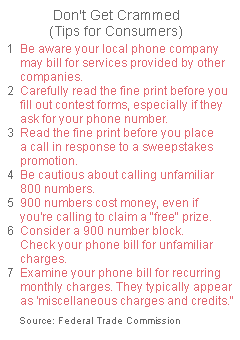|
'Crammers' target small biz
|
 |
April 17, 2000: 10:53 a.m. ET
Unauthorized charges for Internet services cost small businesses millions
|
NEW YORK (CNNfn) - In response to a rapidly growing number of complaints concerning a practice called "Web site cramming," the Federal Trade Commission has issued a warning to small businesses: Read your phone bill carefully and check for unauthorized charges.
Web site cramming -- billing for unauthorized Internet services via phone bills -- is a growing problem for small businesses moving online. Cramming complaints to the FTC from small business owners grew to more than 10,000 by March 1999 from zero just two years earlier. But the FTC says the problem may be much larger because not all businesses have identified the unauthorized charges.
"Thousands of small businesses have been ambushed by Internet crammers and it has cost that community millions of dollars in less than two years," said Jodie Bernstein, director of the FTC's bureau of consumer protection. "Whether consumers signed up for this trial offer or not, they got billed for a service that was supposed to be free."
How it happens
In most cases, the small business learned of an unauthorized charge on its  phone bill for free Web site services. The business owners were, in many cases, contacted by a telemarketer touting the benefits of doing business on the Internet and offering to design and host a Web site for a free 30-day trial period. Many claim they were billed for services immediately. Others claim they were told they would not be charged until they ordered the service on a permanent basis. Even some who refused the free service were billed. phone bill for free Web site services. The business owners were, in many cases, contacted by a telemarketer touting the benefits of doing business on the Internet and offering to design and host a Web site for a free 30-day trial period. Many claim they were billed for services immediately. Others claim they were told they would not be charged until they ordered the service on a permanent basis. Even some who refused the free service were billed.
Some business owners complained about the charges but were met with threats to bring in a collection agency. In some cases, the Web site operator played verification tapes the business owner said did not contain his or her voice.
One small business owner, who asked not to be identified, said he contacted the company billing him to cancel the service. The charges kept coming so he changed his phone number several times in an attempt to end the unauthorized charges. It didn't work.
Change in billing law opened scam door
Charging for services on a phone bill used to be something only the telephone company could do, when it was a monopoly. Initially, after the breakup of AT&T (T: Research, Estimates), anyone could charge consumers on their phone bill so long as they had an agreement with the local telephone company. Consumers started paying for services such as voice mail and psychic hot lines through their phone bill.
One of the unfortunate consequences is that scam artists figured out they could make charges on phone bills that the subscriber did not authorize. In some cases, unknowing consumers gave permission to have something charged to their phone when they signed sweepstakes forms. In other instances, scam artists induced consumers to call them and then they used the phone number they saw over the caller ID system to bill them for services.
Because the billing system was a new one, most of the phone companies did not have fraud prevention measures in place.
FTC, FCC on the case
The FTC has pursued nine federal court actions against 45 defendants on cramming charges since April 1998. The FCC is working with phone  operators to develop "truth in billing" guidelines. The FCC is focusing on making bills easier to read so consumers and business owners will know who is charging them, what services they are paying for, and letting them know where they can go to get more information about the charges on their bills. operators to develop "truth in billing" guidelines. The FCC is focusing on making bills easier to read so consumers and business owners will know who is charging them, what services they are paying for, and letting them know where they can go to get more information about the charges on their bills.
The FTC stated the best protection against such business scams is knowledge and vigilance. The agency created the following recommendations for small business owners to avoid Web site cramming:
1. Know your rights. If you receive bills for services you didn't order, don't pay. The law allows you to treat unordered services as a gift.
2. Review your phone bills as soon as they arrive. Be on the lookout for services you haven't ordered or authorized.
3. Assign purchasing to designated staff. And document all your purchases.
4. Train your staff in how to respond to telemarketers.
5. Buy from people you know and trust. 
|
|
|
|
|
 |

|

